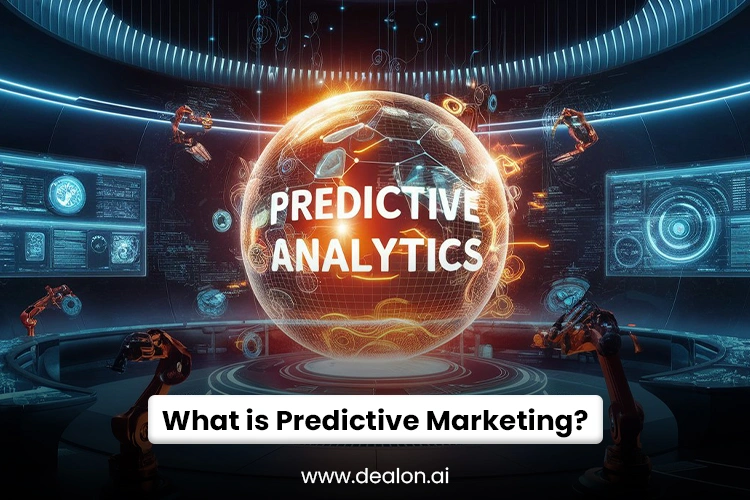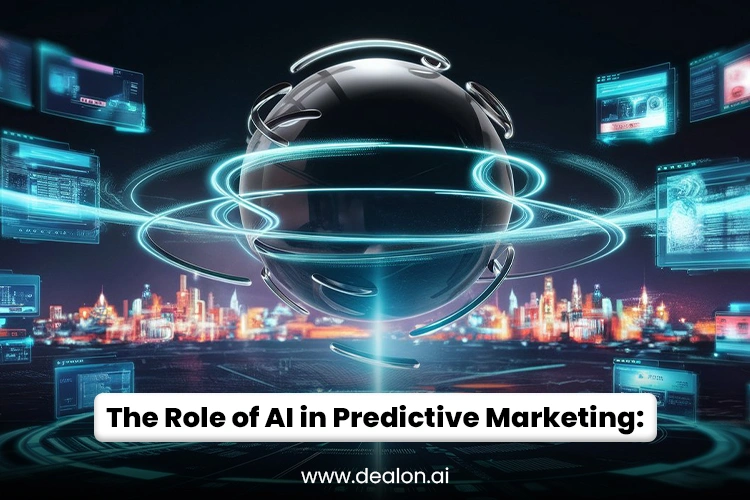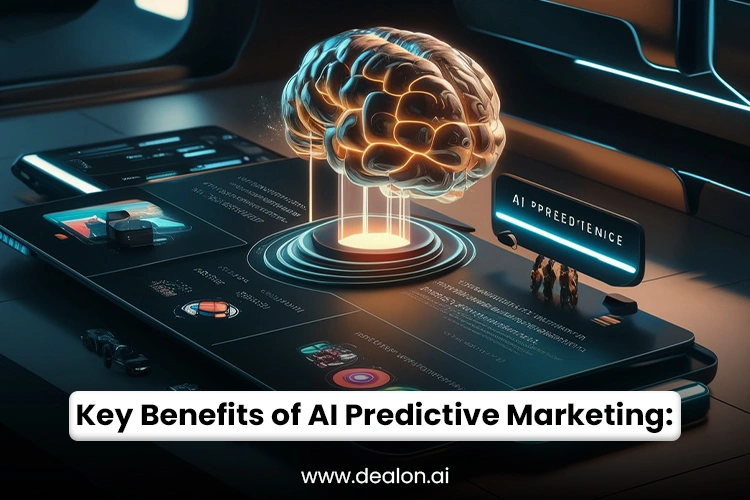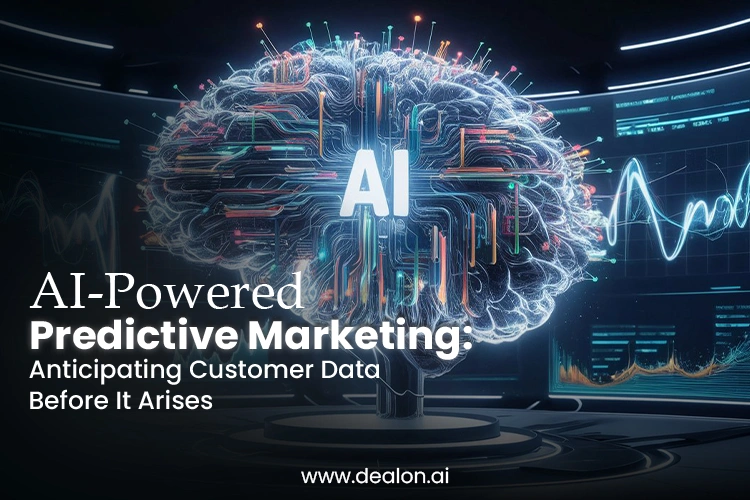In today’s fast-changing digital world, businesses strive to stay ahead of competitors and deliver more personalized customer experiences. Predictive Marketing is at the heart of this evolution, an innovative approach that leverages the power of artificial intelligence (AI) to anticipate consumer behaviors and desires before they manifest. By analyzing vast, multifaceted datasets—from past purchasing habits to social media interactions—AI algorithms can accurately forecast emerging trends, preferences, and potential customer actions.
This forward-thinking strategy allows marketers to proactively craft highly tailored campaigns, ensuring they resonate with customers on a deeper level and at precisely the right moment. As businesses embrace AI-driven predictive marketing, they optimize their marketing efforts and revolutionize how they engage with consumers. In this post, we will delve into how predictive marketing is reshaping the future of customer engagement, driving more informed decision-making, improving ROI, and unlocking transformative opportunities for growth in today’s data-rich ecosystem. By leveraging AI to foresee the needs of consumers before they are even voiced, businesses are positioned to stay one step ahead in an ever-changing digital marketplace.
Also Read: 5 Uses of AI in Crafting Hyper-Personalized Marketing Campaigns In 2025
What is Predictive Marketing?

Predictive marketing is a cutting-edge approach utilizing advanced data analytics and AI to forecast future consumer behavior and trends. Unlike traditional marketing techniques, which typically focus on analyzing past actions, predictive marketing takes a forward-thinking approach by anticipating what customers will do next. Businesses can glean valuable insights into future customer actions by mining vast datasets, including browsing histories, purchase patterns, demographic profiles, and social media interactions. These insights enable companies to create highly targeted, dynamic marketing campaigns that resonate with individual consumers on a deeper, more personalized level.
These models process data to uncover patterns and trends, enabling businesses to better understand customer preferences, purchasing habits, and future demands. For example, an e-commerce platform can predict which products a customer will likely purchase next or anticipate when they might churn, allowing businesses to re-engage them proactively before they depart.
The strength of predictive marketing is its ability to help businesses take proactive actions instead of reacting to trends. Marketers can craft individualized messaging, recommend tailored products, and deliver personalized offers that align with the predicted needs of their customers. This level of personalization enhances the customer experience and drives higher conversion rates and greater brand loyalty.
The Role of AI in Predictive Marketing

AI is at the core of predictive marketing, transforming how businesses anticipate customer needs and behaviors. In the digital age, data is generated astonishingly, and traditional analysis methods cannot keep pace with the vast volumes of information. By utilizing ML algorithms, AI can autonomously learn from new data and adapt its predictions, refining its ability to forecast future customer behavior with incredible precision.
Machine learning algorithms are mainly instrumental in predictive marketing because of their ability to evolve continuously. Unlike traditional data analysis, where insights are static, ML models become more accurate and nuanced as they are fed fresh data. Over time, these algorithms can identify subtle shifts in consumer behavior, such as changes in purchasing habits or evolving preferences, and respond accordingly. For instance, AI can predict which product a customer is likely to buy and the optimal timing for sending personalized offers or the ideal price point that would trigger a purchase.
AI also enables real-time decision-making, allowing marketers to respond instantly to shifting trends and market dynamics. This agility is invaluable in an era where consumer expectations evolve rapidly, and businesses must stay ahead of the curve. By utilizing AI to forecast customer actions, brands can optimize their strategies, offering hyper-targeted content, products, and promotions at the right moment. This results in greater customer satisfaction, increased conversion rates, and a more effective, revenue-driven marketing strategy. AI empowers predictive marketing to move beyond guesswork, enabling data-driven decisions that yield measurable business outcomes.
Key Benefits of AI-Powered Predictive Marketing

As businesses increasingly turn to AI-powered predictive marketing, its advantages are becoming evident. Companies can create meaningful and impactful marketing strategies by leveraging artificial intelligence to anticipate customer behaviors and preferences. Below are the key benefits that AI brings to predictive marketing.
Personalized Customer Experiences
The heart of predictive marketing lies in its ability to deliver highly personalized customer experiences. By analyzing extensive data, AI can predict customers’ next move, from their preferred products to browsing habits and future purchasing behaviors. This predictive insight allows businesses to tailor their messaging, offers, and content to each individual. With personalized campaigns that align with a customer’s unique needs and preferences, companies can significantly increase the likelihood of conversion. Furthermore, such bespoke experiences help foster deeper emotional connections, enhancing customer loyalty and trust.
Optimized Marketing Strategies
AI-driven predictive marketing allows for agility that traditional marketing strategies cannot match. By analyzing customer behavior in real-time, predictive analytics enables marketers to adjust campaigns instantaneously, optimizing every aspect of their outreach. Whether it’s determining the ideal time to send an email, the best channel for engaging customers, or the most effective content to deliver, AI guarantees that every interaction is optimized for maximum impact. These real-time adjustments ensure businesses align with their customers’ evolving needs, leading to more successful and efficient campaigns. Automation further enhances this process, enabling continuous optimization without manual intervention and freeing up valuable resources for other strategic initiatives.
Improved Customer Retention
Predictive marketing isn’t just about attracting new customers—it’s also instrumental in retaining existing ones. By identifying early signals of potential customer churn, such as reduced engagement or changes in purchasing patterns, AI empowers businesses to take proactive measures before a customer disengages. These signals could prompt personalized interventions, such as sending special offers, re-engaging content, or reaching out with tailored communications. This proactive approach minimizes the risk of churn and reinforces the relationship with the customer, showing that the business truly understands and values their needs. Predictive marketing keeps customers satisfied and engaged, contributing to long-term loyalty and sustained revenue growth.
Increased Revenue and ROI
AI-powered predictive marketing drives revenue growth by ensuring businesses focus on high-value prospects and optimize their sales funnel. By anticipating customer needs and presenting relevant offers at the right moment, companies increase their chances of conversion. Predictive analytics also empowers businesses to identify customers most likely to respond approvingly to specific offers, permitting them to concentrate efforts where they will achieve the most significant impact. This allows for better resource allocation, ensuring marketing budgets are spent more effectively. Predictive marketing increases the likelihood of immediate sales and enhances long-term ROI by building stronger, more meaningful customer relationships.
Real-World Applications of Predictive Marketing
AI-powered predictive marketing is revolutionizing various industries, offering unprecedented insights into consumer behavior and enabling businesses to craft personalized, highly effective marketing strategies. Across sectors, organizations are leveraging predictive analytics to anticipate customer needs, improve engagement, and optimize outcomes. Below are some of the key applications of predictive marketing in different industries.
E-Commerce
E-commerce platforms like Amazon, eBay, and Shopify have become frontrunners in utilizing predictive marketing to enhance customer experiences and drive sales. By analyzing past browsing patterns, purchase history, and search queries, these platforms can recommend highly relevant products to individual shoppers. Predictive algorithms suggest products based on previous purchases and forecast items a customer might be interested in based on behavioral trends from similar users. This personalized approach enhances the probability of conversions, as customers will likely purchase products that align with their preferences. Additionally, predictive marketing allows e-commerce platforms to optimize pricing strategies, promotional offers, and inventory management.
Healthcare
Predictive marketing is critical in offering personalized care plans and improving patient outcomes in healthcare. AI-powered predictive analytics can identify high-risk patients in advance, allowing healthcare providers to intervene early and mitigate potential health issues. For example, by analyzing historical patient data, predictive models can identify individuals who may need preventive treatments or screenings, helping to reduce the occurrence of chronic conditions. Furthermore, healthcare providers can use predictive marketing to improve patient engagement by anticipating when patients need follow-up appointments or medication refills. By offering tailored recommendations for care, medical institutions can increase patient satisfaction and foster better long-term health outcomes.
Banking and Finance
The banking and finance industries increasingly leverage AI-driven predictive marketing to optimize customer relationships and offer tailored financial products. Banks use predictive analytics to identify potential loan applicants by analyzing customers’ spending behaviors, credit history, and economic patterns. This allows institutions to assess creditworthiness accurately and proactively offer qualified candidates loans. Predictive marketing tools also help banks anticipate when clients need financial advice or a new service, such as investment opportunities or retirement planning. Banks can immediately present highly relevant promotions and services by anticipating these needs.
Travel and Hospitality
In the travel and hospitality sector, AI-powered predictive marketing enhances the customer experience by anticipating travelers’ needs and personalizing their journeys. Airlines, hotels, and travel agencies harness predictive analytics to suggest destinations, accommodations, or vacation packages based on customers’ past travel behavior, preferences, and even social media activity.
By offering personalized suggestions, travel businesses can increase customer engagement and loyalty, making their services more appealing and valuable. Furthermore, predictive marketing allows these companies to optimize pricing strategies, identify high-demand periods, and adjust availability accordingly, ensuring they remain competitive and profitable.
Overcoming Challenges in Predictive Marketing
As predictive marketing evolves, several challenges must be addressed to unlock its potential fully. While businesses are reaping the benefits of AI-driven insights, navigating the complexities of data privacy and prediction accuracy remains crucial for successful implementation.
Data Privacy Concerns
Data privacy has become a massive crisis for consumers in the digital age. Individuals are demanding greater transparency and control over their data With increasing awareness of how their personal information is being collected and used. As predictive marketing relies heavily on customer data to anticipate needs and behaviors, businesses must establish robust privacy policies prioritizing consumer trust.
Transparency is essential—marketers must communicate how data is gathered, stored, and leveraged to enhance customer experiences. Providing customers with the choice to opt out of data collection, implementing robust data encryption, and adhering to privacy regulations like GDPR are essential to establishing trust. Furthermore, adopting ethical AI practices—where predictive models are designed to respect privacy while delivering personalized marketing—can mitigate concerns and help businesses maintain customer loyalty.
Accuracy of Predictions
The accuracy of predictions is another critical hurdle in predictive marketing. AI algorithms are only as good as the data fed into them, and incomplete or biased data can skew results, leading to inaccurate forecasts. This is especially problematic when decisions are made based on predictions that do not reflect customers’ preferences or behaviors. To overcome this challenge, marketers must use high-quality, comprehensive, and diverse datasets.
Continuous monitoring and fine-tuning of algorithms are also essential to improve predictive accuracy. Evaluating data sources regularly and applying ethical guidelines is vital to avoid reinforcing existing biases. Moreover, incorporating feedback loops where customer behaviors are continuously analyzed can help algorithms learn from real-time data, improving the precision of future predictions.
The Future of AI-Powered Predictive Marketing
The future of AI-powered predictive marketing is set to revolutionize how businesses engage with customers, blending personalization with precision like never before. As AI transforms, its capacity to process vast datasets in real-time will allow brands to anticipate customer needs accurately. Predictive marketing will become more integrated into the customer journey- from content creation to seamless customer service- in personalized product recommendations and the entire ecosystem.
As AI algorithms become more sophisticated, the personalization of marketing strategies will reach unprecedented levels. Marketers can create hyper-targeted campaigns, offering individualized content and promotions at opportune moments. The intersection of AI and ML will also increase customer service, with chatbots and virtual assistants becoming increasingly adept at solving problems and providing personalized solutions in absolute real time.
Moreover, as AI models improve, they will predict what customers want and how they feel, adapting strategies to emotional cues and behavioral signals. This emotional intelligence will transform the customer experience, developing more potent connections and enhancing brand loyalty.
In this highly competitive landscape, businesses that embrace AI-driven predictive marketing will be empowered with the tools to stay ahead of consumer trends, optimize marketing performance, and drive growth at an accelerated pace. The future of predictive marketing is not just intelligent—it’s transformative.
Conclusion
AI-powered predictive marketing is redefining the landscape of modern marketing, offering businesses the ability to anticipate customer needs before they even arise. Harnessing the power of AI allows companies to analyze extensive datasets, identify meaningful patterns, and deliver hyper-personalized experiences that deeply resonate with their audience. This cutting-edge approach boosts customer engagement and provides tangible results, including higher conversion rates, improved customer retention, and increased revenue.
However, while the benefits are clear, challenges such as data privacy concerns and ensuring the accuracy of predictions must be addressed to fully realize predictive marketing’s potential. Transparency in data collection and providing high-quality, unbiased datasets will be crucial in overcoming these obstacles and building customer trust.
Looking ahead, the future of predictive marketing is undeniably promising. As AI advances, its potential will broaden, enabling businesses to develop more intuitive and effective marketing strategies. With predictive marketing becoming a cornerstone of the customer journey, organizations that adopt this technology will be better equipped to anticipate trends, fulfill customer expectations, and drive long-term growth. In a data-driven world, AI-powered predictive marketing will be a priceless asset for businesses striving to succeed in this competitive landscape.

